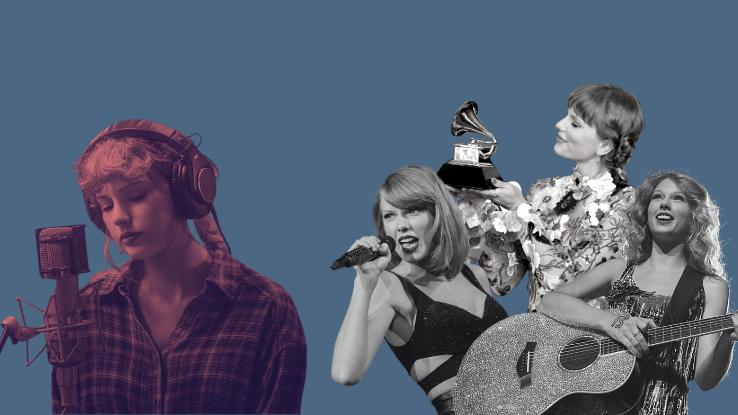Pop Art Fashion Pop Art Love Story

Dorsum in 2008, then-18-twelvemonth-sometime Taylor Swift released Fearless, her history-making and Grammy-winning sophomore album. Thanks to the album'due south state-pop hits, similar "Love Story" and "You lot Belong With Me," Swift rose to mainstream superstar condition. Not to mention, her showtime six albums, and the respective sold-out stadium tours, proved to exist incredibly lucrative — not but for Swift, but also for her then-characterization, Big Automobile Records. In short, the eleven-time Grammy winner, at present 31, has proven herself to exist both an proficient businessperson and an influential artist. But it'due south that second moniker — artist — that Swift's critics however seem to balk at, often because of her earliest hits.
Thirteen years subsequently its initial debut, Fearless is getting a re-release on Apr nine, 2021, under the reworked championship Fearless (Taylor'south Version). In fact, Swift plans to re-tape all six of the albums she released while under contract with Large Machine, which, in add-on to Fearless, include Taylor Swift, Speak At present, Red, 1989 and reputation. The goal, at least in function, is to ain the master recordings of her work.
Recently, the human action of regaining control of the narrative has come up up quite a bit for the musician. And then much of Swift's image was once shaped by her quondam label and managers: In the Netflix documentary Miss Americana, she recalled the "Don't exist similar The Chicks" warnings she received from seasoned industry professionals. And then, of course, in that location was all of that prying media, which presented a narrow (and oft misogynistic) view of Swift and her love life.
In recent years, Swift has taken her image and her music into her own hands. Under Republic Records, Swift has released three albums since 2019: the dreamy, synth-pop Lover; the Grammy-winning cottagecore hit folklore; and the "folkloreverse" follow-up evermore. Despite her success, Swift'southward struggle to regain control of her art has underscored several truths about how we value non just artists, simply their fans as well.
How Taylor Swift's Dispute With Her Old Label Has Inverse the Industry
In June of 2019, Large Machine Records was acquired by Scooter Braun, the talent manager backside pop stars like Justin Bieber. Part of that deal? Braun became the owner of the masters to Swift'due south first half-dozen studio albums. For those who may non be caught up on music industry speak, a primary recording is the original recording — the one all copies stalk from.

"For years I asked, pleaded for a hazard to own my work. Instead I was given an opportunity to sign back up to Big Machine Records and 'earn' one anthology back at a fourth dimension, one for every new one I turned in," Swift posted in the wake of the sale. "I learned about Scooter Braun's purchase of my masters equally information technology was announced to the world. All I could recall about was the ceaseless, manipulative bullying I've received at his hands for years."
Artists from Prince to the Beatles take fought for buying of their masters, merely Swift's dispute was hailed by Rolling Stone as i of the 50 "most important moments" in the music industry in the last decade for a very particular reason. The mag noted that, in "using every tool she'due south got," Swift "plant[ed] herself as a self-made artist who calls her ain shots." Unlike other artists who underwent like disputes, Swift made information technology very public, leveraging her platform against the exploitation of her art.
In April 2020, Big Machine released Live From Clear Aqueduct Stripped (2008), a live album featuring Fearless-era Swift. Upset, the musician made it known that she didn't authorize the release, stating that information technology was a move total of "shameless greed" — peculiarly amongst the COVID-nineteen pandemic. Previously, Swift had said her musical legacy was in the easily of someone who'd "dismantle it" — and that seemed to exist coming to fruition. By October 2020, Braun had sold Swift's masters, videos and artworks to Shamrock Holdings for a big pay day.
Equally for Swift? Dorsum in August 2019, earlier the COVID-xix pandemic or the release of Live From Clear Channel Stripped (2008) or the 2d auction of her masters, she announced her plan to re-tape her showtime six albums. By Nov 2020, that process was well underway.
Long story short? It was a bad time. And, moreover, the public dispute underscored that even someone with a platform every bit massive every bit Swift's is open to industry exploitation. "Throughout my whole career, characterization executives would just say: 'A nice girl doesn't force her opinions on everyone. A nice girl smiles and waves and says thank you,'" Swift said in Miss Americana. "I became the person that anybody wanted me to be."

In fact, perhaps the almost heart-opening part of Miss Americana is Swift's insistence on being on the "right side of history" — of taking everything from her image to her beliefs into her own hands. For her whole career, Swift didn't speak out about politics or other potentially stratifying issues — something she feared doing because of the manner many of The Chicks' fans forced Natalie Maines and her bandmates into exile due to their criticisms of former President George W. Bush. "[W]hat happened to [The Chicks] was existent outrage," Swift told Diversity. "I registered it — that you're always one comment away from being done being able to make music."
In 2018, Swift wanted to speak out about then-Senatorial candidate Marsha Blackburn, an anti-LGBTQ+, Republican politico from Tennessee. When reflecting on why she didn't publicly back a presidential candidate in 2016, Swift made it clear that she felt her "battered public paradigm" wouldn't have helped Hillary Clinton's presidential campaign. But, feeling regretful about her silence in 2016, Swift confronted her father and the other members of her squad who'd ever influenced her decisions and prototype. "Dad, I need you lot to forgive me for [proverb something]," she says after a tense moment in Miss Americana, "because I'chiliad doing it."
After Swift posted about how Blackburn both "appall[ed] and terrifi[ed]" her, Vote.org saw a smashing of registrations: 65,000 people registered in a single 24-hour period. Like any musician with a massive platform, the power of Swift's voice is two-fold: not merely a means of artistic expression, but a means of rallying back up, too. And, without a doubt, information technology'due south that enduring support that has helped Swift plough the tides in the dispute over her masters.
Music Made for Women and Girls Is Often Devalued — and So Are Artists Like Taylor Swift
While Swift has worked to reshape her image and speak her listen, she has also contended with being put into a box, musically speaking. "Artists should own their own piece of work for so many reasons," Swift posted on her Instagram in March 2021. "But the most screamingly obvious ane is that the artist is the but one who really knows that body of work."

And she's certainly proved that she knows what her fans want. For example, so many of Swift'due south listeners institute themselves bolstered by the surprise release of folklore, an anthology that, finally, might take solidified Swift's ability to wear many musical hats. Sure, Fearless had cross-genre appeal, simply it didn't stop others from writing her off. Despite Red's stone edge, the prevailing narratives in the media oft focused on the songs' subject matter — the people Swift had dated. And while 1989 may have solidified her status as a bonafide pop star, Swift was e'er accounted too something. Too state. Likewise pop. As well music-for-young-girls.
Harry Styles, Swift's boyfriend 2021 Grammy winner and a sometime male child band member, possibly put it all-time. When asked if he feels the need to bear witness himself and his audio to listeners outside of One Direction's scope, the now-solo musician said, "Music is something that's always irresolute. There'due south no goal posts. Immature girls like the Beatles. You gonna tell me they're not serious [music lovers]?" Styles went on to say that teenage-girl fans and young women are honest: If they similar you, they show up — and "they don't act 'likewise cool.'"
And all the same, any immature woman or girl who has liked pop music, a bestselling YA romance novel or any other work marketed to them has probably felt some corporeality of shame. Or endured some kind of "teasing." As Styles was quick to signal out, "pop" is short for "popular." And yet, even now, artists whose piece of work resonates with young women and girls are yet devalued. As if something can't be commercial and creative — or as if immature women and girls don't have expert sense of taste or essential stories to share and partake in.
Similarly, putting Swift in a box — analytical her for relationships, for her youthfulness, for her pop prowess — underscores this trouble. That is, the fashion the cultural chat treats artists like Swift often reflects the manner we value others like her and the perspectives she captures in her music. "[Fearless] was the diary of the adventures and explorations of a teenage girl who was learning tiny lessons with every new crack in the facade of the fairytale ending she'd been shown in the movies," Swift tweeted. And, without a doubt, those are stories that deserve to be told and, moreover, heard past those who've lived their own versions of them.
Head First, Fearless (Taylor's Version)
"When I think back on the Fearless album and all that yous turned information technology into, a completely involuntary grin creeps across my face. This was the musical era in which so many inside jokes were created between us, then many hugs exchanged and hands touched, then many unbreakable bonds formed," Swift wrote in a recent postal service, speaking directly to her longtime fans. "So before I say anything else, allow me just say that it was a existent honor to get to be a teenager alongside you."

The first unmarried off the Fearless re-release was Taylor's Version of "Honey Story," which doesn't audio too drastically different from the original. In that location are some new pauses and different twangs — the kind of rich and precise production constitute in folklore. But the nearly heady deviation? The assuredness in Swift'southward voice.
This is a confident, in-control artist who's looking dorsum and retelling a story she once sang in a more heat-of-the-moment way. Sure, nosotros may know the lyrics all likewise well, but, this fourth dimension, there'south a knowing fondness in Taylor's voice for a time that once was — for what'south beingness re-recorded and re-remembered.
0 Response to "Pop Art Fashion Pop Art Love Story"
Post a Comment